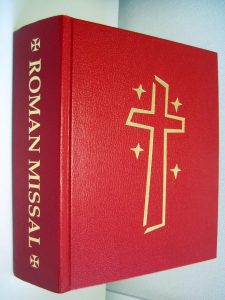by ROWENA OREJANA
New Zealand’s bishops will not push for another translation of the Missal from Latin to English but will seek a loosening up of the principles of translation.

Auckland Bishop Patrick Dunn, the country’s representative on the International Committee for English in the Liturgy, said, “I think we sort of accept that the new English Missal is now
the new Missal. There is not a lot of energy for another new missal. But we’d like to get the principles of translation improved for future translation work.”
Bishop Dunn said the push for a more dynamic translation is something they will take to the Congregation for Divine Worship and the Discipline of the Sacraments when they make their visit ad limina apostolorum (to the threshold of the apostles) in Rome next year.
He said he will also take the proposal to the ICEL meeting in October. “We will just be working in a quiet way,” he said.
ICEL submitted a revised translation of the Roman Missal to the Congregation of Divine Worship in 1998, but it was rejected. ICEL worked on that translation for 17 years.
The Holy See, in 2001, issued Liturgiam Authenticam (the authentic liturgy), which required all translations of original texts from Latin or Scripture from Hebrew, Aramaic and Greek to be translated in the most exact manner “without omissions or additions in terms of their content, and without paraphrases or glosses”.
The congregation established the Vox Clara (clear voice) committee in July 2001, which produced the revised version in 2010. That version was adopted for English Masses in November 2011.
Bishop Dunn, however, said what they hope for is a clear and beautiful translation in contemporary English.
“What we find most difficult are the opening prayers of the Mass, the Collect. Those sentences are
long and sometimes sort of jump over as far as English is concerned. Sometimes neither the priests nor the people know what’s coming next,” he said.
He added, “We’re not calling for a new Missal, but we’re saying, in the future with new liturgical translations, we’d like to see the principles of translation altered so the translation is less literal and more dynamic.”
Bishops treading softly with missal translation
Posted in News
Tee hee. A “less literal and more dynamic” translation = we want to rewrite it to suit our Protestant liberal agenda.
We can be absolutely sure that the prayers of the Collect have nothing to do with it. When did you last attend a Mass wherein the prayers of the Collect were recited ?
We can probably rely on the Holy See to veto further attempts to corrupt the liturgy of the Mass. But wouldn’t it simply be great to have Catholic, honest bishops ?
Well said Leo. Couldn’t agree more. Unfortunately, obedience to Rome has never been a strong suit within the Church in New Zealand. The consequence is that, in recent years, silly “flufferies” and novel “theologies” have come to occupy centre-stage – resulting in neglect/omission of the requirement to teach (and articulate and give witness to) the faithful the unchanging sacramental essentials and core doctrines of our Catholic Faith… and, furthermore, to regularly remind the faithful of their spiritual and temporal obligations to God and his Church. In this current climate of doctrinal “forgetfulness”, it’s no wonder priestly and religious vocations are at minimal levels, which also explains why parishes are being amalgamated left, right, and centre.
Cannot understand why ‘neither the priests nor the people know what’s coming next’. I know what is in my missal what is in theirs?